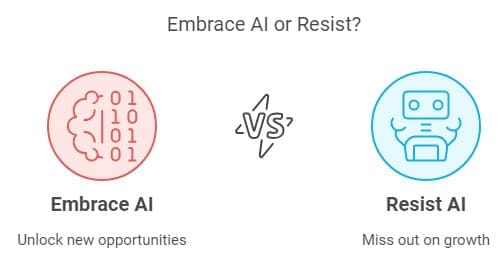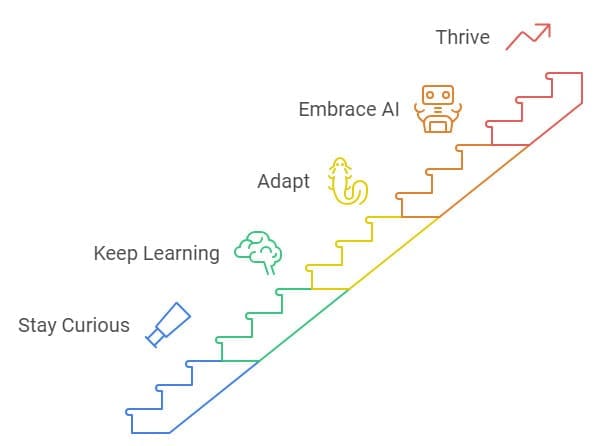Unleashing the Power of AI in Marketing for Businesses
AI in marketing is revolutionizing the way businesses connect with their customers and streamline their operations. As a small business owner, I’ve always been on the lookout for ways to work smarter, not harder. That’s why I’m so excited about the possibilities that artificial intelligence brings to the table. Let’s dive into how AI is reshaping the marketing landscape and what it means for businesses like yours and mine.
The AI Revolution in Marketing Automation
Remember the days when we had to manually send out every email campaign? Those days are long gone, thanks to marketing automation. AI is changing the game completely. It’s like having an assistant who’s always on, never takes a break, and somehow knows exactly what your customers are looking for, 24/7.

AI-Powered Marketing Revolution
From Basic Automation to AI-Powered Insights
Marketing automation has been around for a while, helping us schedule posts and segment our email lists. But AI? It’s like automation on steroids. It doesn’t just follow pre-set rules; it learns and adapts. For example, AI can analyze customer behavior patterns and predict what they might want to buy next. It’s like having a crystal ball for your business!
Spam Filters: The Unsung Heroes of Email Marketing
Ever wonder why your emails actually make it to your customers’ inboxes? Thank AI for that. Sophisticated spam filters use AI to distinguish between legitimate emails and spam, ensuring your carefully crafted messages don’t end up in the digital trash bin.

AI helps eliminate spam
AI-Powered Content Creation: Your New Writing Buddy

AI marketing is a true game-changer for small businesses.
As someone who’s spent countless hours staring at a blank screen, trying to come up with the perfect email subject line, I can’t tell you how excited I am about AI’s content generation capabilities.
From Subject Lines to Blog Posts
AI can now help create:
- Catchy email subject lines
- Engaging social media posts
- Personalized SMS messages
- Full-length blog posts
- Detailed product descriptions
It’s like having a team of writers at your fingertips, ready to churn out content 24/7. But don’t worry, it’s not here to replace human creativity. Think of it as a springboard for your ideas, giving you a head start on your content creation.
Getting Personal with AI
Remember how Amazon seems to know exactly what you want to buy before you do? That’s AI-powered personalization at work, and now it’s available for businesses of all sizes.
Tailoring Experiences, One Customer at a Time
AI analyzes customer data to create personalized experiences that feel almost magical. It can:
- Recommend products based on past purchases
- Customize email content for each recipient
- Adjust website layouts to suit individual preferences
This level of personalization used to be the domain of big corporations with deep pockets. Now, thanks to AI, even small businesses can offer their customers a tailored experience that keeps them coming back for more.

Adopt AI to give your customers next-level personalization
Social Listening: Tuning into Your Customers’ Conversations
Imagine being able to eavesdrop on every conversation about your brand or industry. That’s essentially what AI-powered social listening tools do. They scour social media platforms, analyzing mentions, hashtags, and sentiments to give you a real-time pulse on what people are saying about you and your competitors.
Turning Chatter into Actionable Insights
With social listening, you can:
- Identify emerging trends in your industry
- Spot potential PR issues before they blow up
- Discover what your customers really think about your products
It’s like having your ear to the ground all the time without ever leaving your office.
AI in Media Buying: Making Every Ad Dollar Count

Social Listening and Media Buying highlight the power of small business AI.
If you’ve ever felt like you’re throwing money into a black hole with your advertising, AI in media buying is about to change that. It’s like having a super-smart financial advisor for your ad spend.
Optimizing Ad Placements for Maximum ROI
AI algorithms can:
- Analyze audience data to find the best ad placements
- Adjust bids in real-time for optimal performance
- Predict which ad creatives will resonate with different audience segments
The result? Your ads get in front of the right people, at the right time, for the right price. It’s like having a marketing crystal ball that actually works.
The Time-Saving Magic of AI
As a business owner, time is your most precious resource. AI is like having a time machine that gives you back hours in your day.
Automating the Mundane, Freeing the Creative
With AI handling tasks like:
- Data analysis
- Content generation
- Customer segmentation
You’re free to focus on the big-picture strategy and creative thinking that only a human can do. It’s not about replacing you; it’s about amplifying your capabilities.
Data-Driven Decisions: The AI Advantage
Remember the days of making marketing decisions based on gut feelings? AI is changing that game, giving even small businesses access to data-driven insights that used to be the domain of big corporations.
Turning Data into Dollars
AI can:
- Analyze customer behavior patterns
- Predict future trends
- Identify untapped market opportunities

AI can make customer behavior predictions.
It’s like having a crystal ball that’s powered by data, not magic. With these insights, you can make decisions that are more likely to drive sales and grow your business.
The Human Touch in an AI World
Now, before you start thinking that AI is going to take over everything, let’s talk about the importance of human oversight. AI is a powerful tool, but it’s not infallible.
Quality Control and Brand Voice
While AI can generate content at lightning speed, it’s crucial to remember that it can sometimes miss the mark. It might produce factual errors or content that doesn’t quite align with your brand’s voice. That’s where we humans come in.
Think of AI as your first draft writer, and yourself as the editor-in-chief. You’re there to ensure that everything that goes out aligns perfectly with your brand’s values, tone, and message. It’s a partnership, not a replacement.
Embracing AI: A Small Business Perspective
As a small business owner, I was initially skeptical about AI. It seemed like something only big corporations could afford or benefit from. But I’ve come to realize that AI is leveling the playing field, giving small businesses like mine access to tools and insights that were once out of reach.

Not embracing AI is like not having a website 20 years ago.
Starting Small with AI
You don’t have to dive into the deep end of AI all at once. Start small:
- Try an AI-powered email subject line generator
- Experiment with AI-driven social media post scheduling
- Use AI analytics to better understand your customer base
As you get comfortable with these tools, you can gradually incorporate more AI into your marketing strategy. It’s not about replacing your marketing team; it’s about giving them superpowers.
The Future of AI in Marketing
The world of AI in marketing is evolving at breakneck speed. What seems cutting-edge today might be standard practice tomorrow. But one thing’s for sure: AI is here to stay, and it’s only going to become more integral to successful marketing strategies.
As we look to the future, we can expect to see:
- Even more sophisticated personalization
- AI-powered virtual assistants for customer service
- Predictive analytics that seem almost clairvoyant
The key is to stay curious, keep learning, and be willing to adapt. The businesses that embrace AI and learn to work alongside it are the ones that will thrive in this new era of marketing.

Thriving in AI-Driven Marketing
Frequently Asked Questions
Is AI in marketing only for big businesses?
A: Not at all! While big businesses were early adopters, AI tools are becoming increasingly accessible and affordable for small businesses and nonprofits. Many platforms offer AI-powered features that can benefit organizations of all sizes.
Will AI replace human marketers?
A: AI is a tool to augment human capabilities, not replace them. It handles repetitive tasks and data analysis, freeing up marketers to focus on strategy, creativity, and human-centric aspects of marketing that AI can’t replicate.
How can I start implementing AI in my marketing strategy?
A: Start small by using AI-powered features in your existing marketing tools. Many email marketing platforms, social media schedulers, and analytics tools already incorporate AI. As you get comfortable, you can explore more advanced AI solutions.
Is AI-generated content as good as human-written content?
A: AI-generated content can be a great starting point, but it often requires human editing and oversight to ensure it aligns with your brand voice and meets quality standards. It’s best used as a tool to augment and speed up human content creation, not replace it entirely.
How does AI improve personalization in marketing?
A: AI analyzes vast amounts of customer data to identify patterns and preferences. This allows for highly personalized content, product recommendations, and customer experiences that would be impossible to create manually at scale.
AI in marketing is not just a trend; it’s a fundamental shift in how we approach connecting with our customers and growing our businesses. By embracing these powerful tools, we can create more effective, efficient, and personalized marketing strategies that drive real results. As we continue to explore the possibilities of AI, the future of marketing looks brighter and more exciting than ever before.

